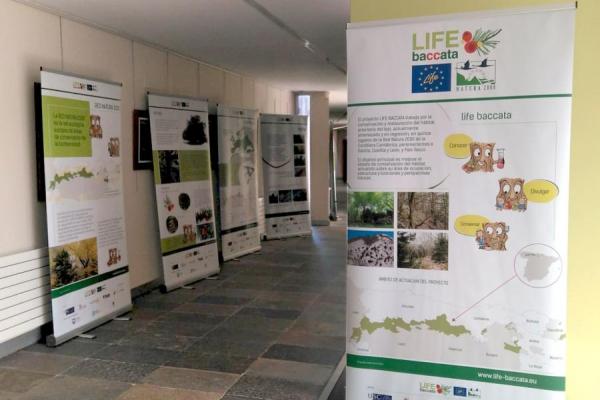THE EXHIBITION "WELCOME TO LIFE BACCATA" IN SARIEGOS
28-07-2020

The Exhibition "Welcome to LIFE BACCATA" begins its journey in the municipality of Sariegos, León. It can be visited until September 20th in the Town Hall, from Monday to Friday, in the morning from 9 am to 2 pm.
"Welcome to LIFE BACCATA" has been conceived to share knowledge about the yew tree and woods, as well as the LIFE project that intends to improve the state of conservation of their habitat in 15 Special Areas of Conservation (SAC) of the Cantabrian Mountain Range.
Through this exhibition you can get to know this tree of enormous cultural, natural and scientific value, as well as raising awareness of the importance of preserving its habitat.
The exhibition addresses the following topics:
- The LIFE BACCATA project
- Yew biology
- Ecological diversity
- Distribution
- Habitat
- Associated flora
- Fauna and yew woods
- Culture and traditions
- Threats
- Conservation and restauration
- The yew in the Nature 2000 Network
About yew woods and LIFE BACCATA
The yew (Taxus baccata L.) is a non-resinous evergreen tree with a large body, long-lived and with very slow growth. The natural area of this species comprises Europe, Central, North and West Asia, Morocco, Algeria, Azores and Madeira. In the Iberian Peninsula it is found in all mountain ranges and in the Balearic Islands, being more frequent in the North. It prefers cool and humid places, shady ravines and deep soil valleys, being more abundant in the mountains than in the plains. It resists well to cold and needs a certain minimum degree of humidity in the environment and soil. The pressure that has been exerted on this species since ancient times due to its multiple uses, the decrease and fragmentation of its habitat due to forest fires among other phenomena, the grazing of herbivores and the competition for light with other tree species are the main threats. Together with its great environmental, cultural and scientific value, these threats have made the yew woods an habitat of priority interest for the European Union.
With the aim of contributing to their conservation, the LIFE project "Conserving and Restoring the Yew Woods (9580*) in the Cantabrian Mountains" (LIFE BACCATA) has been launched.
The project's actions are aimed at improving their state of conservation and that of their habitat, promoting environmental education and raising awareness and participation of the society.
The LIFE BACCATA project is co-financed by the European Commission within the framework of the LIFE Call for Proposals and it has beem developed between 2016 and 2020 in fifteen sites of the Natura 2000 Network in the Cantabrian Mountain Range, Galicia, Castilla y Leon, and the Basque Country. The University of Santiago de Compostela participates as coordinator of the project and the Region Castilla y León, CESEFOR, Fundación HAZI and Grupo TRAGSA as partners.
"Welcome to LIFE BACCATA" has been conceived to share knowledge about the yew tree and woods, as well as the LIFE project that intends to improve the state of conservation of their habitat in 15 Special Areas of Conservation (SAC) of the Cantabrian Mountain Range.
Through this exhibition you can get to know this tree of enormous cultural, natural and scientific value, as well as raising awareness of the importance of preserving its habitat.
The exhibition addresses the following topics:
- The LIFE BACCATA project
- Yew biology
- Ecological diversity
- Distribution
- Habitat
- Associated flora
- Fauna and yew woods
- Culture and traditions
- Threats
- Conservation and restauration
- The yew in the Nature 2000 Network
About yew woods and LIFE BACCATA
The yew (Taxus baccata L.) is a non-resinous evergreen tree with a large body, long-lived and with very slow growth. The natural area of this species comprises Europe, Central, North and West Asia, Morocco, Algeria, Azores and Madeira. In the Iberian Peninsula it is found in all mountain ranges and in the Balearic Islands, being more frequent in the North. It prefers cool and humid places, shady ravines and deep soil valleys, being more abundant in the mountains than in the plains. It resists well to cold and needs a certain minimum degree of humidity in the environment and soil. The pressure that has been exerted on this species since ancient times due to its multiple uses, the decrease and fragmentation of its habitat due to forest fires among other phenomena, the grazing of herbivores and the competition for light with other tree species are the main threats. Together with its great environmental, cultural and scientific value, these threats have made the yew woods an habitat of priority interest for the European Union.
With the aim of contributing to their conservation, the LIFE project "Conserving and Restoring the Yew Woods (9580*) in the Cantabrian Mountains" (LIFE BACCATA) has been launched.
The project's actions are aimed at improving their state of conservation and that of their habitat, promoting environmental education and raising awareness and participation of the society.
The LIFE BACCATA project is co-financed by the European Commission within the framework of the LIFE Call for Proposals and it has beem developed between 2016 and 2020 in fifteen sites of the Natura 2000 Network in the Cantabrian Mountain Range, Galicia, Castilla y Leon, and the Basque Country. The University of Santiago de Compostela participates as coordinator of the project and the Region Castilla y León, CESEFOR, Fundación HAZI and Grupo TRAGSA as partners.





